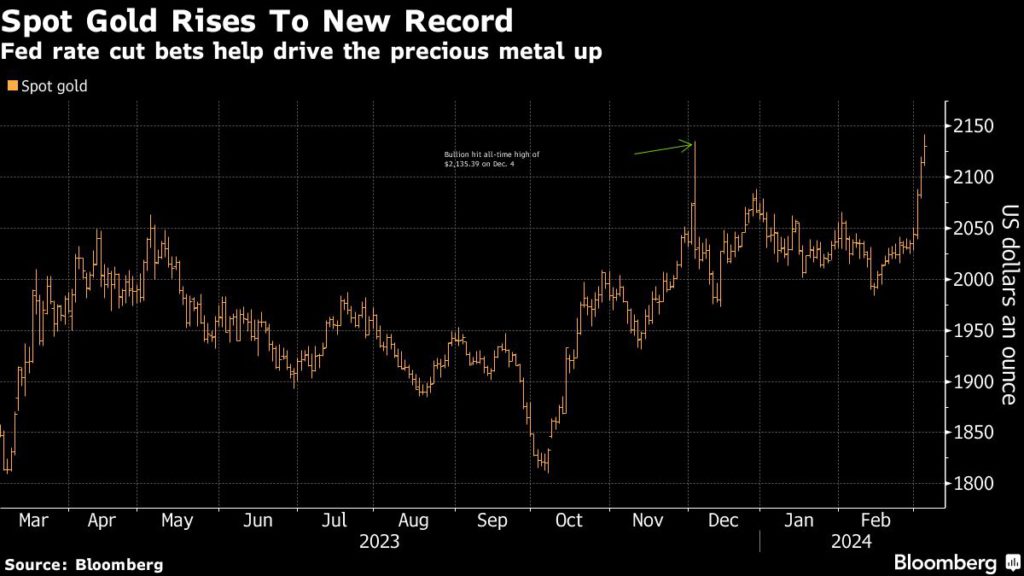Gold price sets new record on Fed pivot, geopolitical risks

Gold prices have now set a new an all-time high after speculation over a Federal Reserve pivot and geopolitical risks underpinned a rally in the precious metal.
On Tuesday, spot gold rose as much as 1.3% to hit a new record of $2,141.60 per ounce, before paring its gains to 0.6%. US gold futures had a similar run, peaking at $2,150.50 per ounce then falling to $2,134.80.

[Click here for an interactive chart of gold prices]
Gold has added about $100 in the past five sessions, fueled by a combination of expectations for monetary easing, geopolitical tensions and the risk of a pullback in equity markets.
According to Bloomberg, the scale of the recent move has surprised some market watchers, who said it may be partially driven by momentum,
The rising risk of a stock market correction — flagged by weak US manufacturing data on Friday — may have persuaded some investors to move out of equities and into gold, said Ole Hansen, commodity strategist at Saxo Bank A/S.
While the timing of the Fed’s pivot remains uncertain, signs that it’s getting closer have supported gold since mid-February. Swaps markets show an almost 60% chance of a rate cut in June, a higher probability than early last month.
The recently rally has also highlighted an increasing disconnect between spot prices and outflows from bullion-backed exchange traded funds. Holdings in SPDR Gold Shares, the world’s largest such ETF, fell by 0.3% on Monday, taking the total to the lowest level since July 2019, according to data compiled by Bloomberg.
Those outflows have partly been offset by persistent central bank demand for the precious metal, which helped keep prices elevated even as real interest rates spiked last year. Bullion was also supported over the Lunar New Year, as Chinese consumers sought a hedge against turmoil the country’s stock market and property sector.
In the first months of this year, gold’s role as a haven asset is being underlined by elevated geopolitical risks, with attacks on shipping in the Red Sea showing escalating Middle East tensions. China’s economic woes and the US presidential election at the end of the year make it a potentially volatile mix.
“Speculation over a Fed rates pivot and continued geopolitical tensions keep gold shining,” said Ewa Manthey, commodities strategist at ING Groep. “We expect gold prices to trade higher this year as safe-haven demand continues to be supportive amid geopolitical uncertainty with ongoing wars and the upcoming US election.”
Still, bullion has further to go to reach its inflation-adjusted peaks set more than a decade ago. It has risen more than 600% since the turn of the millennium, though adjusted for inflation it remains below the high of $850 touched in January 1980, which would be equivalent to more than $3,000 in today’s dollars.
(With files from Bloomberg)
{{ commodity.name }}
{{ post.title }}
{{ post.date }}




Comments